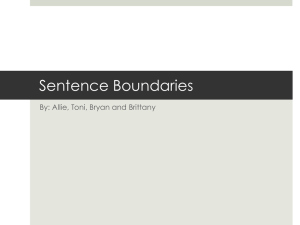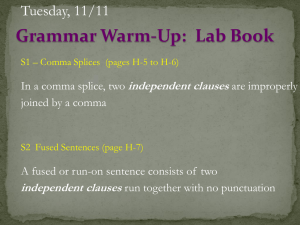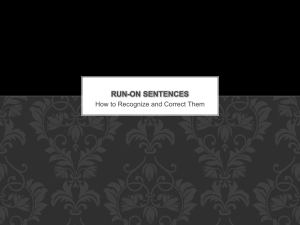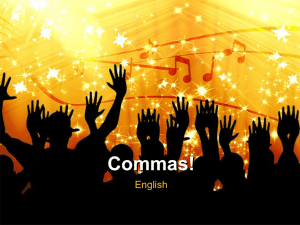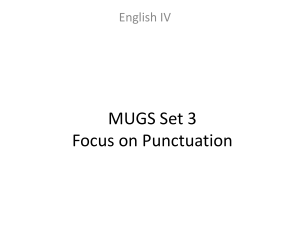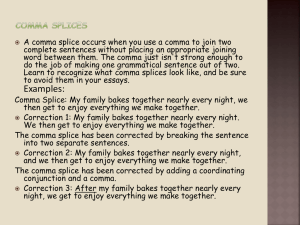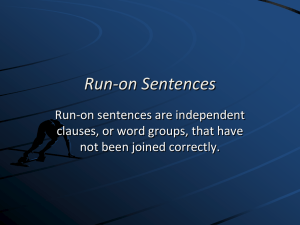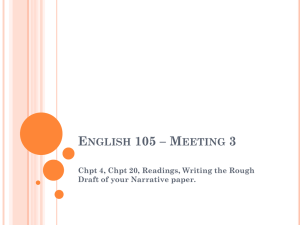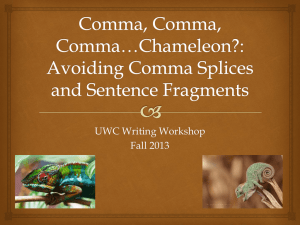Avoiding Run-on Sentences, Comma Splices, and Fragments
advertisement
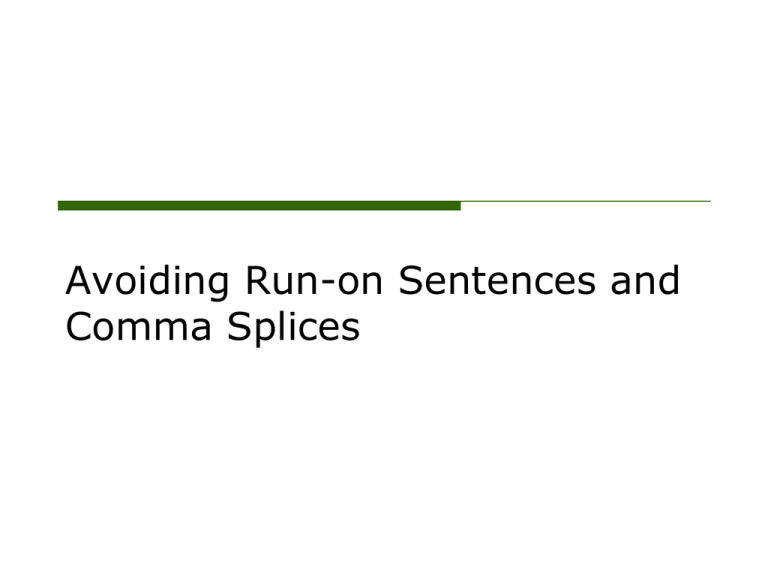
Avoiding Run-on Sentences and Comma Splices What does a comma signal? o A comma signals a pause. (It tells the reader to slow down briefly but then keep going until the thought is completed.) o I like grammar , and I like this class. o Because I like grammar , I like this class. What do periods and semicolons signal? o Semicolons and periods signal a full stop. The idea is complete. o I love grammar . I love this class. o I love grammar ; I love this class. What is a run-on sentence? o A run-on is a sentence error caused by running one sentence into another without putting any punctuation in between. o We all like grammar we all love this class. Run-on What is a comma splice? o , A comma splice is a sentence error caused by putting just a poor, weak comma between two complete sentences. o We all like grammar , we all love this class. The first way to correct comma splices and run-ons is to… o separate them with a period, creating two complete sentences. STOP We all like grammar. We all love this class. Now you try! Use a period to correct these run-ons and comma splices. o These punctuation rules aren’t hard I know how to avoid run-ons. o These punctuation rules aren’t hard. I know how to avoid run-ons. Correct! o My new supervisor has been making all sorts of changes, she is really causing problems. o My new supervisor has been making all sorts of changes. She is really causing problems. Correct! The second way to correct comma splices and run-ons is to… o Link them with a semicolon; this creates two complete sentences just as a period does, but the second sentence doesn’t start with a capital letter. STOP We like grammar ; we love this class. No caps! Now you try! Use a semicolon to correct these run-ons and comma splices. o I know what I have to do to succeed in school I just have to find the time to do it. o I know what I have to do to succeed in school; I just have to find the time to do it. Correct! o Doing the work is easy, it’s finding the time that is so hard. o Doing the work is easy; it’s finding the time that is so hard. Correct! The third way to correct comma splices and run-ons is to… o end the first clause with a semicolon and begin the second with a conjunctive adverb or transitional. We like grammar ; STOP therefore, we love this class. Now you try! Use a semicolon and a transitional word like therefore or however to correct these run-ons and comma splices. o I’ve studied my grammar book carefully I won’t have any problems on this quiz. o I’ve studied my grammar book carefully; therefore, I won’t have trouble on this quiz. Correct! o I’m not going to give up, however, I do sometimes get discouraged. o I’m not going to give up; however, I do sometimes get discouraged. Correct! The fourth way to correct comma splices and run-ons is to… o join the two sentences with a comma and one of the FANBOYS (for, and, nor, but, or, yet, so). o We all like grammar , and we all love this class. Now you try! Use one of the FANBOYS to correct these run-ons and comma splices. o I want a raise I want more vacation days. o I want a raise, and I want more vacation days. Correct! o I want a raise, I don’t want any more responsibilities. o I want a raise, but I don’t want any more responsibilities. Correct! The last way to correct comma splices and run-ons is to… o join the two separate sentences into one with a subordinating conjunction or relative pronoun. o We all like grammar, we all love this class. dependent clause comma splice Because we all like grammar, we all love this class. dependent clause OK! o All students who like grammar love this class. Now you try! Use a subordinating conjunction like although or a relative pronoun like which to correct these run-ons and comma splices. o We are going to give it a try we don’t know if it will work. o We are going to give it a try although we don’t know if it will work. Correct! o I’m struggling but finally beginning to understand, this is making me happy. o I’m struggling but finally beginning to understand, which is making me happy. Correct! The main cause of sentence errors: o confusing the different kinds of joining words Refer to Chapters 10 and 11 in Foundations First if you aren’t sure which kind of word it is and what punctuation is needed. STOP Let’s try a few, just to make sure you can catch any punctuation errors! Which is correct? o I understand run-ons, however, I’m still having trouble with comma splices. o I understand run-ons; however, I’m still having trouble with comma splices. Which is correct? o I’m really good with punctuation because I have been practicing so much. o I’m really good with punctuation; because I have been practicing so much. Which is correct? o I waited for the bus, it took nearly twenty minutes to arrive. o I waited for the bus, which took nearly twenty minutes to arrive. Which is correct? o I’ve been given a number of new duties, for example, I now have to do all the filing. o I’ve been given a number of new duties; for example, I now have to do all the filing. Which is correct? o The performers are attractive, talented, and likable; it’s too bad the script is terrible. o The performers are attractive, talented, and likable, it’s too bad the script is terrible. Which is correct? o This grammar practice is useful although, I sometimes wish we didn’t have to do so much of it. o This grammar practice is useful although I sometimes wish we didn’t have to do so much of it. Which is correct? o This grammar practice is useful; in fact, I wish we could do more of it. o This grammar practice is useful, in fact, I wish we could do more of it. You’ve got it! No more comma splices or run-on sentences ever again! To review how to avoid run-on sentences and comma splices, see Chapters 14 and 15.
